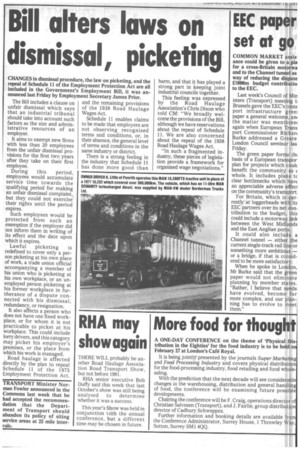Bill alters laws on dismissal, picketing
Page 6

If you've noticed an error in this article please click here to report it so we can fix it.
CHANGES in dismissal procedure, the law on picketing, and the repeal of Schedule 11 of the Employment Protection Act are all included in the Government's Employment Bill, it was announced last Friday by Employment Secretary James Prior.
The Bill includes a clause on unfair dismissal which says that an industrial tribunal should take into account such factors as the size and administrative resources of an employer.
It aims to exempt new firms with less than 20 employees from the unfair dismissal provisions for the first two years after they take on their first employee.
During this period, employees would accumulate service time towards the qualifying period for making an unfair dismissal complaint,, but they could not exercise their rights until the period expires.
Such employees would be protected from such an exemption if the employer did not inform them in writing of its effect and the date upon which it expires.
Lawful picketing is redefined to cover only a person picketing at his own place of work, a trade union official accompanying a member of his union who is picketing at his own workplace, or an unemployed person picketing at his former workplace in furtherance of a dispute connected with his dismissal, redundancy, or resignation.
It also affects a person who does not have one fixed workplace, or for whom it is not practicable to picket at his workplace. This could include lorry drivers, and this category may picket his employer's premises, or the place from which his work is managed.
Road haulage is affected directly by the plan to repeal Schedule 11 of the 1975 Employment Protection Act, and the remaining provisions of the 1938 Road Haulage Wages Act.
Schedule 11 enables claims to be made that employers are not observing recognised terms and conditions, or, in their absence, the general level of terms and conditions in the same industry or district.
There is a strong feeling in the industry that Schedule 11 has done more good than harm, and that it has played a strong part in keeping joint industrial councils together.
This feeling was expressed by the Road Haulage Association's Chris Dixon who told CM: "We broadly welcome the provisions of the Bill, although we have reservations about the repeal of Schedule 11. We are also concerned about the repeal of the 1938 Road Haulage Wages Act.
"In such a fragmented industry, these pieces of legislation provide a framework for organised wage negotiations."




















































































































